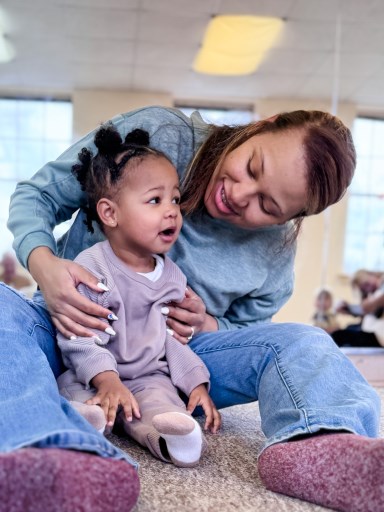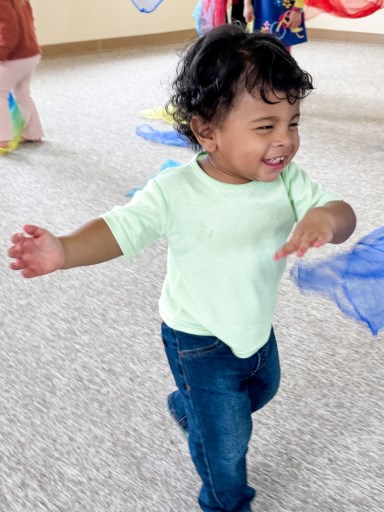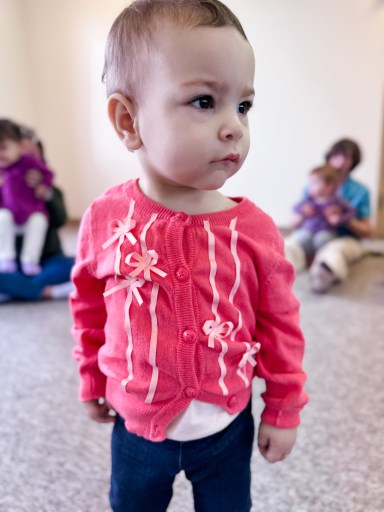
We know that toddlers will engage in class in their own unique way. Some toddlers will stay close to their caregiver, observing and listening. Some toddlers might crawl or toddle around. Others will be in the thick of things-- jumping, dancing, and twirling. ALL of these behaviors represent wonderful ways of learning! Children learn constantly, through observation, interactions with adults and other children, and through imitation, play, and movement.
Visual/Auditory Learning Style:
When toddlers are in expressive mode-- clapping their hands, tapping their feet, playing instruments, dancing-- we get proof that they're engaged and learning. When toddlers are in receptive mode-- sitting still, silently listening, watching, taking it all in-- we have to trust that so much more is happening in their brains than we can observe. When learning to talk, children spend months (and years!) listening to their important grown-ups talk to them and around them. After spending a chunk of time receiving, they start to experiment with language sounds, like “ma” and “ba." This cycle goes around and around, first receiving and then expressing, until the sounds turn into words and eventually into sentences. This is how it is with music development, too. Young children spend a lot of time receiving music and then they play with making sounds at first, then pieces of songs, and eventually full songs. The more you sing with your child, the more they'll have to receive and learn. Co-founder of Music Together Dr.Lili Levinowitz says, "It's like they press 'record' in class and press 'play' at home."
 Kinesthetic Learning Style:
Kinesthetic Learning Style:
Some children like to stand and move throughout most of the class. They might be in a kinesthetic learning phase where they need to use their whole body to learn and process information. In this case, we have to trust that they are absorbing the rich musical environment wherever they are in the room. They do not need to be sitting in the circle "paying attention" to process the music. In fact, if we force toddlers to sit still we are more likely to interfere with their learning than we are to support it. Toddlers are uniquely attuned to their caregivers so if you, as their primary caregiver, are participating with enthusiasm they will take note, no matter where they move in the room.
A Multimodal Approach to Learning:
Before young children can express music externally, they need to receive music and process it internally. We support their music learning by combining a beautiful variety of music (including different meters, tonalities, genres, and languages) with a multi-sensory approach. Seeing, feeling, and hearing the music gives children multiple ways “in”, no matter what their learning style might be. This multi-modal approach leads to richer, more complete learning.
And we support you in continuing to make music together with your toddler throughout the week. In addition to giving you ideas and inspiration in class, you receive access to a new collection of music and a new songbook every time you enroll. The more familiar the music becomes, the more you and your toddler will feel comfortable exploring and experimenting in class. This familiarity maximizes everyone's learning and everyone's joy. BONUS: caregivers who aren't able to attend class with your toddler are still able to nurture their musical growth at home with the help of these take-home materials!
 By participating in class, playing with the music at home, and snuggling up with the delightfully illustrated songbook at bedtime, you'll be giving your toddler all the nurturing they need to grow musically. As you water the seeds at home and in class, so much will be happening under the surface before we ever see the first blossom! Generally, it takes at least five classes before kids start to feel comfortable enough to explore during class time. Frequently, as was the case with my daughter, kids remain in receptive mode for much longer and they do all of their expressing and experimenting at home.
By participating in class, playing with the music at home, and snuggling up with the delightfully illustrated songbook at bedtime, you'll be giving your toddler all the nurturing they need to grow musically. As you water the seeds at home and in class, so much will be happening under the surface before we ever see the first blossom! Generally, it takes at least five classes before kids start to feel comfortable enough to explore during class time. Frequently, as was the case with my daughter, kids remain in receptive mode for much longer and they do all of their expressing and experimenting at home.
Our classes are so full of joy, bonding, and community-building, it can be easy to forget all of the other benefits of making music together!

|
| Tuesday |
|
Tuesday |
9:30 AM |
09/09/25 |
|
9 weeks |
|
|
|
Tuesday |
10:00 AM |
09/09/25 |
|
9 weeks |
|
|
|
Tuesday |
11:00 AM |
09/09/25 |
|
9 weeks |
|
|
|
Tuesday |
12:30 PM |
09/09/25 |
|
9 weeks |
|
|
Wednesday |
|
Wednesday |
9:30 AM |
09/10/25 |
|
9 weeks |
|
|
|
Wednesday |
10:00 AM |
09/10/25 |
|
9 weeks |
|
|
|
Wednesday |
10:30 AM |
09/10/25 |
|
9 weeks |
|
|
|
Wednesday |
11:30 AM |
09/10/25 |
|
9 weeks |
|
|
Thursday |
|
Thursday |
9:30 AM |
09/11/25 |
|
9 weeks |
|
|
Friday |
|
Friday |
9:30 AM |
09/19/25 |
|
9 weeks |
|
|
Saturday |
|
Saturday |
8:30 AM |
09/13/25 |
|
9 weeks |
|
|
|
Saturday |
9:30 AM |
09/13/25 |
|
9 weeks |
|
|
|
Saturday |
9:30 AM |
09/13/25 |
|
9 weeks |
|
|
|
Saturday |
10:30 AM |
09/13/25 |
|
9 weeks |
|
|
|
Saturday |
11:30 AM |
09/13/25 |
|
9 weeks |
|
|
|
Saturday |
1:30 PM |
09/13/25 |
|
9 weeks |
|
|
Sunday |
|
Sunday |
3:00 PM |
09/14/25 |
|
9 weeks |
|
|
|
Sunday |
4:00 PM |
09/14/25 |
|
9 weeks |
|
|
|